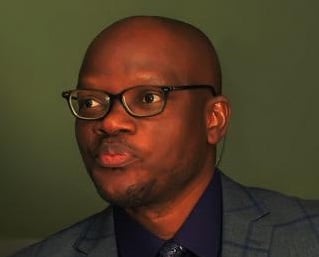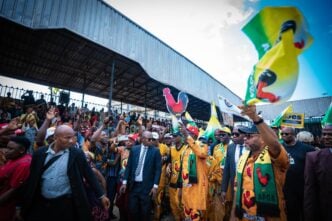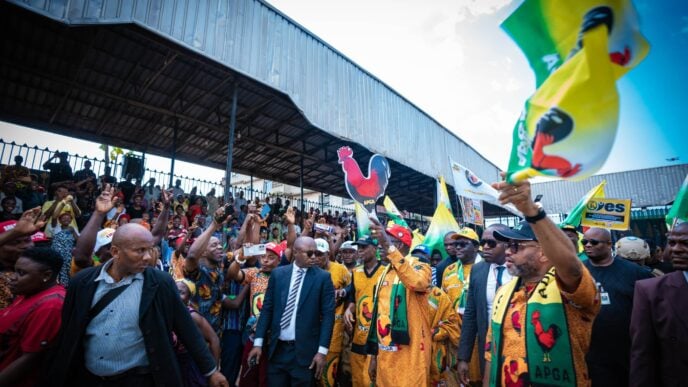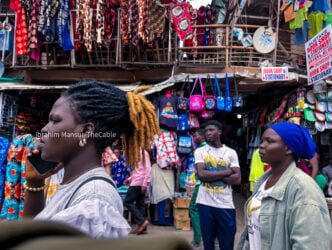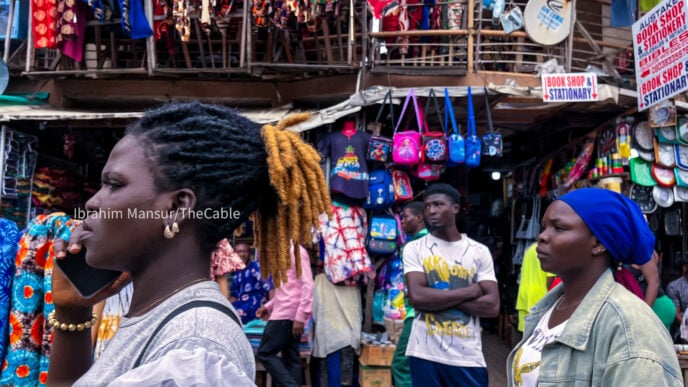ASUU President Chris Piwuna
The Nigerian national conversation is often trapped in a spectacular delusion. Every now and then, the public sphere erupts into a panic over the Academic Staff Union of Universities (ASUU), treating the disruption of university calendars as an existential threat to the nation. We rally, we lament, and we negotiate, acting as if our collective salvation hinges on the smooth operation of tertiary institutions.
I submit that this focus is not merely misguided—it is a catastrophic misplacement of priorities that reveals a deep-seated national immaturity. While our eyes are fixed on the apex, the foundation is crumbling. This conviction aligns perfectly with the observation made by Adedamola Aminu in The Nation on October 31, 2025. While he rightly points out the organisational flaws of opposition parties, his accompanying diagnosis of our education crisis is the real bombshell. Hear him: “What is lacking in Nigeria’s education system is lack of investment, especially in primary and secondary school education. Successive administrations ignored investing in this sector, leaving it to old students to be funding infrastructure development.”
This is the unvarnished truth we keep running from. We are striving for the intellectual Olympics when we haven’t even taught our citizens how to tie their shoelaces. Nigeria is trying to run before it has learned to crawl. University education should not be a serious national priority at our current stage of development. We must shift our gaze to the roots.
The Evidence is Chilling: A Foundational Crisis
Advertisement
Our national fixation on ASUU and its demands serves as a shield for the uncomfortable reality that Nigeria’s foundation—basic education—is fatally flawed. This is where the empirical evidence becomes chillingly clear.
1. The Budgetary Travesty and the Apex Delusion
The perennial argument that Nigeria falls short of the UNESCO benchmark (15% to 20% of the budget) is a widespread one. While critics rightly point to the federal government’s low allocation (often around 7%), a full accounting must also include spending by the 36 states and the 774 Local Government Areas. But let us be brutally honest: even if we combine every tier of government, the effective investment dedicated to high-quality basic education remains tragically insufficient.
Advertisement
Crucially, a significant and disproportionate slice of the current education pie is allocated to the tertiary sector, with agencies like the Tertiary Education Trust Fund (TETFund) receiving substantial statutory levies. We are pouring scarce resources into the narrow apex of the educational pyramid while the broad base rots. As the Yoruba people wisely express it: “A ni Amukun erun re wo, o ni oke le nwo, e wo isale.” (We complain of the tilt in the load on the back of the hunchback, he says, ‘You look at the top, but look at the bottom!’). The problem of education in Nigeria is presently foundational, not at the apex. You cannot solve the problem from the top; you have to get to the root of the issue.
The Strategic Imperative: Funding the Pipeline, Not the Leak
To the practitioners of higher education who rightly note that the apex sector is also severely underfunded, my argument is one of systemic efficiency and developmental sequencing. We are not calling for a cut; we are demanding a strategic pivot to secure the system’s long-term health.
Continuing to inject funds into tertiary institutions while primary and secondary education fail is fundamentally an exercise in subsidising remediation. Universities are forced to spend time and resources teaching basic writing, numeracy, and critical thinking skills that should have been mastered a decade earlier. This bloats university budgets, diverts professors from advanced research, and devalues the specialised degree being offered.
Advertisement
Investment yields the highest societal Return on Investment (ROI) when it enables citizens to transition from illiteracy to functional literacy. This creates a stable economy and a functional democracy. Therefore, for a defined period, national educational spending must be prioritised towards fixing the foundational leaky pipeline to ensure that future university students are actually worthy of the advanced investment.
2. The Human Capital Deficit and Apex Self-Purification
International studies, notably those using assessments such as the Programme for International Student Assessment (PISA), consistently show that the quality of basic cognitive skills, rather than just years of schooling, is the key driver of long-term economic growth. Nations that sustain high GDP growth tend to excel in primary and secondary education learning outcomes. Nigeria, with its millions of out-of-school children and woeful learning outcomes in basic schools, is actively sacrificing its economic future for the sake of its current university elite. It should not be a case of either or, as both are critical, but should we be putting the cart before the horse?
Poor inputs guarantee poor outputs. The struggle of our universities with global rankings, research quality, and graduate employability is not solely an issue of lecturer pay; it is a direct consequence of the unprepared, remedial-level inputs they are forced to receive. Prioritising the base will ultimately lead to Apex Self-Purification—universities will finally receive students capable of engaging in specialised, advanced study, allowing them to truly excel on the global stage.
Advertisement
3. The Safety and Civilisation Index
High-quality primary and secondary education is not just about economic metrics; it is about public safety and social cohesion. Empirical data often show a strong inverse correlation between low literacy rates and high crime rates. When we fail to educate a generation at the most fundamental level, we are not just creating unemployment; we are actively engineering a future security crisis. A functional, literate, and numerate populace is the first defence against extremism, political manipulation, and widespread disorder.
Advertisement
The Nigerian Paradox: Paying to Be Poor
This foundational failure fuels a unique Nigerian phenomenon: misplaced public anger and self-imposed poverty.
Advertisement
The average Nigerian is justifiably angry about the state of public services, but they often apply pressure in the wrong places and implement ineffective personal solutions. It has become common—even aspirational—to send children to private primary and secondary schools, a trend now extending to tertiary education. This decision, driven by necessity, exacerbates poverty among the working and middle classes.
We have all become private providers of public essentials. When electricity disappears, we seek generators or solar power. When water runs dry, we dig boreholes. When neighbourhood security falters, we organise and pay for private security. We are so eager to take away our governments’ fundamental duties that they must be utterly frustrated! Our willingness to bypass public systems turns us into great entrepreneurs—school proprietors, borehole engineers, and security experts—but it simultaneously exempts our governors from their core mandate, locking citizens into a vicious cycle where we pay twice and get nothing.
Advertisement
A Harsh Dose of Reality: The UK Parallel
If you want to understand what a truly progressive, self-aware nation prioritises, look across the Atlantic. For years, the UK’s University and College Union (UCU) have called strikes over pay and pensions. Has the entire British economy halted? No. Universities have made cuts, staff have protested, and life goes on for the average Briton. I make this comparison not to applaud British university politics, but to highlight a crucial difference in national priorities.
But let basic school standards drop? Let funding for primary and secondary schools crumble? That is the political third rail. An incumbent UK government would face immediate, devastating electoral annihilation if it neglected its primary and secondary school systems.
Why? Because they understand the brutal reality: University is a choice; basic education is a right and a civil necessity. Universities are the icing; our primary and secondary schools are the essential flour and water. Right now, we are polishing the tiny, rotten icing while the entire cake is in the bin.
The Radical Solution: Constitutional Obedience and State Competition
The answer is shockingly simple, and it requires us to stop being sentimental about tertiary education and start being fierce about our foundational rights.
Forget ASUU; Focus on the State Governor: The Nigerian Constitution is clear: Basic education is primarily the responsibility of state governments. The Federal Government’s interventionist projects, including its ‘Unity Schools,’ are expensive, distracting ‘ostrich projects’ that must be devolved immediately to their respective state authorities. The Federal Ministry of Education must be slimmed down to a standards and curriculum oversight body.
Unleash State-Level Educational Competition: Imagine a Nigeria where Kano, Lagos, Bayelsa, Bauchi, Abia, Oyo, and Kaduna states compete not on infrastructure contracts, but on who can achieve the lowest primary-level dropout rate and the highest cognitive skills scores. This competition, fuelled by mandatory investment in local public schools, would be a game-changer.
If a Governor allows schools to fail, the electorate will, within a few budget cycles, lose their fundamental literacy and ability to discern truth from political lies. This failure will immediately translate into electoral defeat. Quality basic education is the ultimate accountability tool.
In 10 to 15 years, the state of this basic education will transform our democracy. It will empower the electorate, make mass vote-buying futile, and make thieving and lazy governors a historical artefact. We must stop being intellectually snobbish about our university education and recognise that our true crisis lies in the dilapidated classroom walls of our primary and secondary schools. Invest in the base, and the apex will take care of itself. Anything less is a continuation of the great Nigerian delusion.
Gbadamosi can be reached at [email protected]
Views expressed by contributors are strictly personal and not of TheCable.

